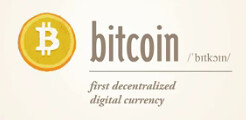
PREV ARTICLE
NEXT ARTICLE
FULL ISSUE
PREV FULL ISSUE
BitCoin: Another Online Currency
Sooner or later the world's inventors, entrepreneurs, and engineers will create a virtual currency that meets all the requirements of the real world. It's a tall order, and all of the failed attempts to date are evidence of that. The forms of money we all grew up with (coins, banknotes, checks, credit cards) are still around, and only checks (or 'cheques' for our British friends) seem anywhere close to disappearing. Here's an article about one of the latest attempts at creating a true virtual currency: BitCoin.
-Editor
The project was started by programmer Satoshi Nakamoto in 2009. But it has picked up steam during the past several months, in part because of some publicity around the project. Bitcoin also benefited a bit from the controversy over PayPal cutting off the ability to send money to WikiLeaks, which for some raised red flags about one company's ability to impede the transfer of money. One of Bitcoin's features is that it is completely decentralized, and so is theoretically immune to censorship or restraint. It doesn't require the use of a bank or payment-handling system like PayPal (which is blocking Bitcoin payments, coincidentally enough). Bitcoin isn't the only venture that is going after the e-currency pie: we've written before about Flattr, the micropayment startup founded by The Pirate Bay co-founder Peter Sunde, which is trying to create a "tip jar"-style payment system for content (the company recently launched a way to integrate payments with Twitter). But Bitcoin is somewhat more ambitious than Flattr, or many of the other micropayment and e-currency experiments that have gone before it. Rather than simply create a kind of virtual points system in which the points can eventually be converted into "real" money - or used to buy goods, the way that frequent-flier points and other quasi-currencies (such as "Canadian Tire money") can - the founders of Bitcoin want to create a completely separate and virtual monetary system. In other words, one that could theoretically replace the existing system if enough people decided to use it. That's the difficult part, of course. Why would anyone use a virtual currency that has no "real" value, and is based on a system run by a group of shadowy hackers? Some programmers have started to accept payment in Bitcoins, but that's not really a great indicator of a robust monetary platform - in a sense, it's just like people exchanging goods or services in a barter system, something that is a big part of what economists call the "underground" or shadow economy. Supporters (including the Electronic Frontier Foundation) promote the idea that Bitcoins are free from government interference and can't be frozen or devalued by anyone. The idea of virtual currency isn't really that far-fetched in some ways. Money as we know it is already somewhat virtual, since the pieces of paper and bits of metal that we use to pay for things don't have any actual value themselves - their only value is that they can be exchanged at stores for things that actually have value, like food. Their underlying worth is determined by the central banking system and the government, through a series of federal guarantees, the setting of interest rates and so on (money used to be backed by physical gold in Fort Knox, but that hasn't been the case since the 1970s). And what is Bitcoin's value backed by? Well, that's where things get complicated. The value of a Bitcoin is determined in part by supply and demand - the system is set up so that there are only a finite number of Bitcoins in existence, which prevents the problem of people just "printing" more Bitcoins the way crumbling governments have in places like Germany in the 1920s. Bitcoins are actually generated by the routine functions of a computer that is processing large mathematical problems (known as "Bitcoin mining"), so the supply is controlled, and will never exceed 21 million. Even apart from convincing people that they should start accepting or using it as currency, however, the biggest problem Bitcoin could have is a legal one: if the U.S. government decides to treat it as a "private currency," then it could be subjected to all kinds of strict regulation - such as the need to integrate with the taxation system, or provide for exchange into U.S. currency at certain rates - or it could simply be outlawed entirely.
To read the complete article, see:
How BitCoin Wants to Make Money Even More Virtual
(gigaom.com/2011/05/16/how-bitcoin-wants-to-make-money-even-more-virtual/)
The Numismatic Bibliomania Society is a non-profit organization promoting numismatic literature. See our web site at coinbooks.org. To submit items for publication in The E-Sylum, write to the Editor at this address: whomren@gmail.com To subscribe go to: https://my.binhost.com/lists/listinfo/esylum All Rights Reserved. NBS Home Page Contact the NBS webmaster 
|
